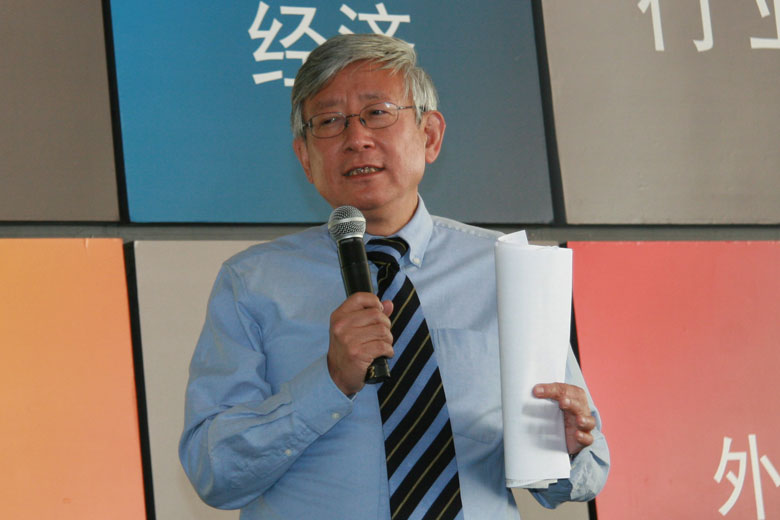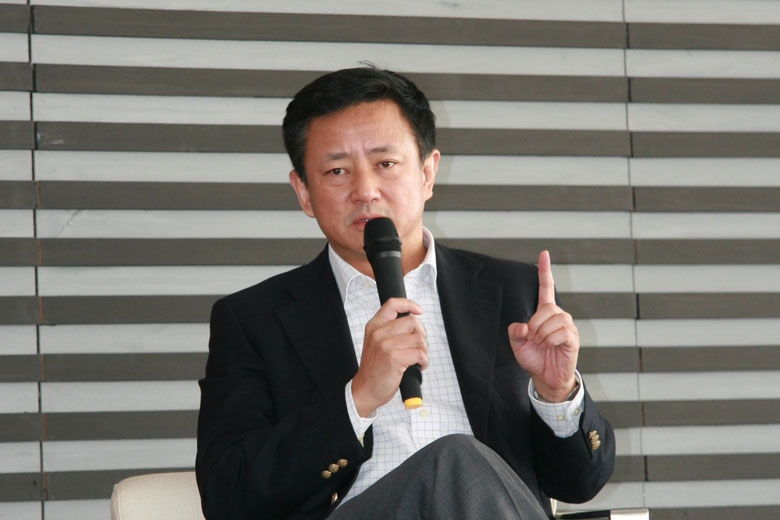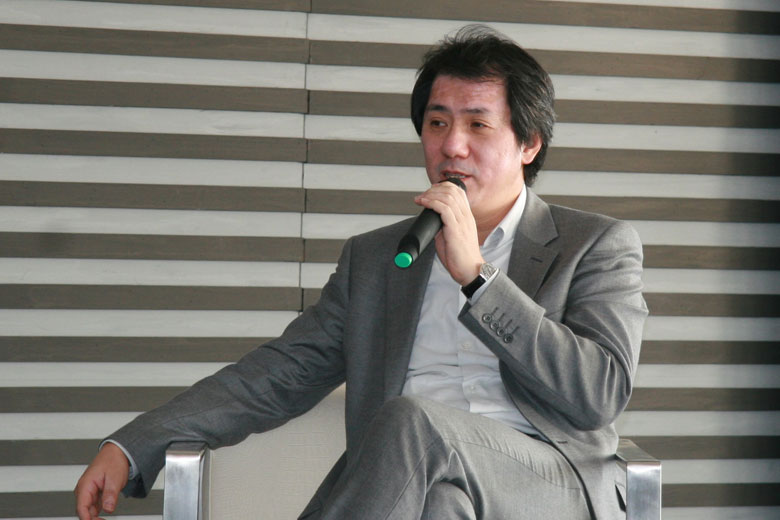Economic forum of Shihua Caixun: China is strong enough to tide over the economic downturn --- dialogue among Fan Gang, Yu Pun Hoi and Cao Jingxing
- Categories:Media Coverage
- Time of issue:2008-12-04 13:54
(Summary description) On November 29, the economic forum themed "Chinese Economy 2009: Dialogue on International Financial Crisis and the Opportunity and Challenge for China's Economic Development" was held in Shenzhen. F
Economic forum of Shihua Caixun: China is strong enough to tide over the economic downturn --- dialogue among Fan Gang, Yu Pun Hoi and Cao Jingxing
(Summary description) On November 29, the economic forum themed "Chinese Economy 2009: Dialogue on International Financial Crisis and the Opportunity and Challenge for China's Economic Development" was held in Shenzhen. F
- Categories:Media Coverage
- Time of issue:2008-12-04 13:54
【Shihua Caixun】 On November 29, the economic forum themed "Chinese Economy 2009: Dialogue on International Financial Crisis and the Opportunity and Challenge for China's Economic Development" was held in Shenzhen. Fan Gang, Secretary of China Reform Foundation and Head of National Economic Research Institute, Yu Pun Hoi, Chairman of Shihua Caixun, and Cao Jingxing, senior commentator were invited for summit talks on the topic of opportunity and challenge for China's 2009 economic development in face of international financial crisis.

Guest host Cao Jingxing introducing the guests
On the forum, all the guests were optimistic of the basic trend of China's macro-economy. Their opinion was that, the adjustment during economic development was unavoidable and the current economic slowdown was the result of macro-control policy to avoid an overheated economy, which was actually the optimum adjustment of the economic development cycle. In face of the most serious economic adjustment probably since the reform and opening up, they believe that China is strong enough to tide over the difficulties, and what follow this optimum adjustment will be 10 to 20 or even 30 years of rapid growth.
Given the current economic situation home and abroad, many people are pessimistic about the stability and growth of China's economy. However, Fan Gang pointed out that the speeding slowdown of domestic economy (including depression in real estate) was the result of a series of government cooling measures. Over the past three to four years, Chinese government has taken many cooling policies to curb the overheated economy and make it return to a reasonable growth interval: slowing investment since 2004, RMB appreciation since 2005, reduction of export rebates at the meantime in combination with a series of industrial policies and macro policies, and finally in September 2007, policies on real estate were also launched.

Fan Gang, Secretary of China Reform Foundation, giving his speech
Fan Gang said, at the same time however, we should be aware of the fact that China is still one of the best economies in the world. In a dynamic point of view, there are no big bubbles in China's economy at present because we have been curbing bubbles for the past several years. Taking the real estate for example, the bubbles in this sector has generally been eliminated after more than a year's adjustment. No bubble means no major crisis in the future; therefore, no major fluctuation will appear either. In a static point of view, China's economy is pillared by the best finance, the most prudent monetary policies and the strongest foreign exchange reserve in the world. To begin with, China absolutely has the best finance in the world. Firstly, the revenue in the first half of 2008 increased by 30%, and national bonds only made up 20% of GDP, which is far better than that of developed European and American countries. Secondly, monetary supply is relatively prudent, so there is no inflation pressure at all. Thirdly, foreign exchange reserve totaled USD1.9 trillion, and there is continuous growth in foreign trade surplus, which ensures there won't be any problem in China's international payment.

Yu Pun Hoi, Chairman of Shihua Caixun, giving his speech
Yu Pun Hoi agreed with Fan Gang on his optimistic judgment. He pointed out that China would play an important role in global economy. Although this is probably the most serious economic adjustment since reform and opening up, China will be strong enough to overcome this difficult phase. China's financial reserve, foreign exchange reserve and residents' savings are all very high. Enterprises have strong creativity and flexibility, and various social economic forces are also healthy. All of these are strong pillars that will help Chinese economy to tide over the temporary difficulties.
Fan Gang added that China had many advantages to resist impact of this crisis. Firstly, world economy has undertaken great changes compared with that in 1929. Today, developing countries take up 50% of world GDP, and latest statistic shows that China's export to these countries is increasing, which balances out the part of export decrease to developed countries. Secondly, the majority of China's export products are low-end with cost edge, the sale of which is expected to see some increase at a time of economic slowdown. Thirdly, the price fall of production materials has greatly eased the cost pressure on domestic enterprises.
As to the worsening situation in China for the past several, especially couple of months, Fan Gang deemed that factors on international market were the major cause, namely the following three: first, direct order reduction in export and import; second, declined market anticipation on international needs. Decline in international needs led to price slump of many products, which caused great impact on many domestic industries and accelerated the economic downturn. For example, steel price dropped by 50% within one month and all steel enterprises are seeing production cut and shrink. Third, psychological impact. Out of fear of the economic crisis, many investors choose to wait-and-see, leading to stagnation in investment.
Fan Gang said that, since this year, government has been adjusting policies according to economic development trend and actual development situation, which showed the best flexibility in history and effectively prevented major economic fluctuation and slump. However, Yu Pun Hoi gave his opinion from the perspective of the enterprises. As far as he was concerned, the recent policy adjustment was a little late and in a rush, not forceful and stable enough. For instance, the Central Bank announced on November 27 that it would respectively lower the RMB benchmark deposit and lending interest rates of all financial institutions by 1.08 percentage points, which was really rare in history. Yet the good thing is we can know better about government strategies. Many enterprises have accumulated some anti-surge abilities over the past years' macro-control. Through this time's policy adjustment, enterprise runners like us have seen the sign of economic recovery.
How has the international financial crisis influenced Chinese economy and what lessons China should draw from it? Yu Pun Hoi's opinion was that the China's financial sector, such as banking, capital market and foreign exchange market was the weakest part in China's economic practice to be in line with international standards. Therefore, the ongoing financial tsunami won't have structural impact on Chinese economy. Fan has always been against the idea of China hurrying into mixed financial operation. From 1930s to 1990s, the U.S. had undergone sixty years of separate operation, and all systems have been soundly established. On the contrast, no such systems have been built in China; therefore, if we follow their steps too quickly, China will be faced up with enormous financial risks. In a word, for such senior financial levels as mixed operation, we'd rather take it slow and reconsider it after the U.S has changed its supervision model.
In his answers, Fan Gang suggested that China should learn good lessons from this crisis, especially from the U.S. Their amendment and adjustment of financial system in the future are also worth of careful analysis. Risk caused by supervision loophole shall not happen again. A number of problems were revealed in the Asian financial crisis ten years ago, especially the reform problems in developing countries, and this time, problems of advanced market is revealed as well, which is really a good chance for us to learn. From these experiences and lessons, the development of Chinese economy will be healthier, more stable, and with less fluctuation.
According to Fan Gang, there is only about 40% to go for this financial crisis, yet the economic recession is just beginning and successive problems will come. Problems such as decrease in export orders are just beginning, and the three major economies, the U.S, Europe and Japan have just officially entered a recession. It is quite likely that the western economy will experience a recession of one or two years, and then see a slow growth for one or two years. Chinese enterprises should be well prepared for the largest financial crisis and most serious economic depression in thirty years.
While being optimistic, we should also be aware of the problems. Yu Pun Hoi emphasized that the outside influence was not a problem for the current Chinese economy, as long as we made appropriate adjustment, which means following the road of scientific development, and reasonable adjustment of the overall structure. Through the timely adjustment, Chinese economy will reach the phase of more scientific development. We should not only recognize these problems, but also reflect on the lessons drawn from the western countries objectively and professionally, and make reasonable adjustment based on the lesions, so as to avoid repeated mistakes.
【Shihua Caixun】 will continue to hold the theme activity of "Economic Forum of Shihua Caixun", where more renowned economists will gather for summit talks and in-depth exploration over the topics of 2009 Chinese economy and financial market.
Today's activity is sponsored by 【Shihua Caixun】and CE Dongli, organized by Caixun.com, The Peninsula and Soufun.com, and co-organized by ICBC Shenzhen Branch. Strategic media cooperators are China Economic Times and Tencent Finance. Supporting media include: Securities Daily, International Online, China.com, China Youth Online, Hexun.com and Ccstock.com.
For details, please refer to the link of Economic forum of Shihua Caixun.
http://service.caixun.com/activity/shihua_forum/index.shtm
About【Shihua Caixun】(www.shihua.com.cn)
【Shihua Caixun】is the largest financial information supplier with the most comprehensive services in mainland China. It provides financial information terminal and authorization service to financial institutions, universities, enterprises and media, with information covering global macro economy, securities, foreign exchange, commodity market and major domestic industries. I-cube, double screen financing terminal and a-cube financing terminal produced by 【Shihua Caixun】are capable of providing all-wave finance information and analysis, which therefore become the major reference tools for investors and managerial staff to make cross-market and global investment decisions, and to predict and analyze industrial trends.
【Shihua Caixun】is a product and service brand run by Beijing Shihua International Finance Information Company Limited, founded in 1993, the company is headquartered in Beijing. Over 500 professionals nationwide provide 24 x 7 services via branch offices cross the country and online client service stations.
